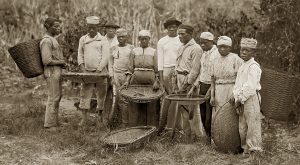
The sociologist Florestan Fernandes addresses the legacy of a white society in relation to a crippled and impoverished Afro-Brazilian population living within the state of Sao Paulo. Fernandes refutes the accepted belief that equality exists among races and argues that the Afro-Brazilian was never prepared to compete equally in a free-labor society. Fernandes claims that this allowed white Brazilians and white Europeans to continually surpass them in the social and economic stage. The Negro in Brazilian Society is an empirical essay published in 1969. It looks specifically at the state of Sao Paulo, Brazil because, as Fernandes points out Sao Paulo is the ideal setting for racial relation studies. For the purpose of our own studies, The Negro in Brazilian Society is a primary source because describes results of a sociological study. This essay was intended to show that Brazil was not the beacon of racial equality that it claims to be but on the contrary, is a system that discriminates against the Afro-Brazilians in various ways.
The second unit of our Race in Latin America studies is Blackness in Brazil. Fernandes essay The Negro in Brazilian Society strongly contributes to the unit because of its thesis and conclusion. Abolition occurred about 80 years before this essay was published which declared constitutional equality for all races yet, there is still strong discrimination and inequality for the Afro-Brazilian. This essay takes an in-depth look at the social and economic factors affecting the Afro-Brazilian which in turn affects how the Afro-Brazilian as a race and as an individual is viewed.
It should be addressed that although Fernandes supported his claim of inequality between whites and Afro-Brazilians with data from multiple Sao Paulo censuses, a few of his tables were somewhat ambiguous such as Table 4 – Births, Deaths, and Stillborns. These ambiguities cloud his credibility. Nonetheless, Fernandes is a social justice warrior. He criticizes a vast majority of Brazilians claiming that they hold a “prejudice of having no prejudice” allowing them to be oblivious to the severe inequality among them. He offers rational arguments about how immigrants out-competed Afro-Brazilians in the free-labor market and how the legacy of slavery affected job opportunities for the Afro-Brazilians as well.
DQ’s
A common phrase today with regard to racism in the United States is “I am colorblind, therefore I don’t see race.” Is that phrase similar to Fernandes’ claim that white Brazilians have a prejudice of having no prejudice?
What are the major factors that led to white immigrants out-competing Afro-Brazilians in the labor market?
